Food Studies News
Food studies students honored for excellence, achievement
As it does each year, the Department of Nutrition and Food Studies recognizes its students with awards for outstanding achievements in academics, research, service and other areas of scholarship.
This year, on Friday, May 8th 2020, The Department of Nutrition and Food Studies united virtually to present awards to our undergraduate and graduate students and to celebrate all their significant accomplishments over the past academic year.
This meeting was a modification to the usual in-person end of the year ceremony which was converted to a virtual ceremony this year in order to manage the circumstances of the COVID-19 pandemic. More than 50 members of the Department of Nutrition and Food Studies along with their families and friends, came together to attend the ceremony. The NFS awardees were celebrated for their wide range of impressive academic and community engagement accomplishments.
They have made great contributions in their areas of excellence, and we look forward to hearing about the value they contribute to the communities where they live and work. To all of our students, and especially the Class of 2020, we know you are ready to embrace the world that needs all you have to offer!
Award winners in the Food Studies program:
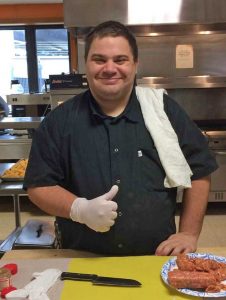
Chef’s Prize – Edward Crossman
This is awarded to a Food Studies major or minor who demonstrates exceptional ability in the culinary arts. This ability should also include food justice and community engagement goals of the Food Studies Program.
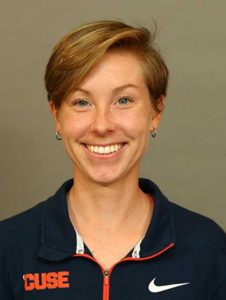
Food Studies Research Award – Maggie Toczko
This is awarded to a Food Studies major or minor who demonstrates exceptional ability in the culinary arts. This ability should also include food justice and community engagement goals of the Food Studies Program.
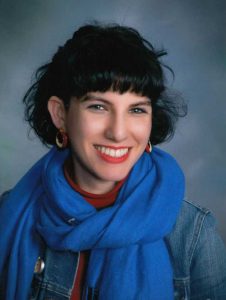
Food Studies Justice Award – Deborah Orieta
This is awarded to a Food Studies major or minor who demonstrates the ability to successfully address food justice-related issues through a variety of mediums.

Food Studies Community Engagement Award – Assata Cradle-Morgan
This is awarded to a Food Studies major or minor who demonstrates the ability to create or implement progressive food-based initiatives that engage diverse politics locally, nationally or internationally.
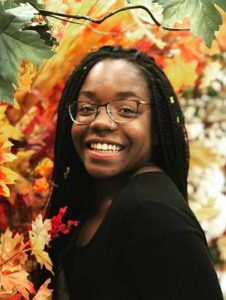
Food Studies Culture and Commensality Award – Neena Hussey
This is awarded is given to the Food Studies major who has expanded the Food Studies program to new audiences by sharing food knowledge and practice through social activism
Roseane do Socorro Gonçalves Viana Human Rights Awards:
Best Undergraduate Paper – Sierra Endreny
Best Graduate Papers – Chanel Gaude, Elizabeth Pickard, Gabriel Roth
This award is given to the best undergraduate and graduate papers on the human right to food, nutrition, and/or health. Roseane do Socorro Gonçalves Viana, Brazilian nutritionist and right to adequate food activist and writer, left a powerful message of hope and belief in the essential goodness of each and every person, of the need to take on our individual and collective responsibilities to ensure the welfare and dignity of all and for each and everyone, that all struggles are important and must be respected, and, most of all, that the voices of the affected must be heard.
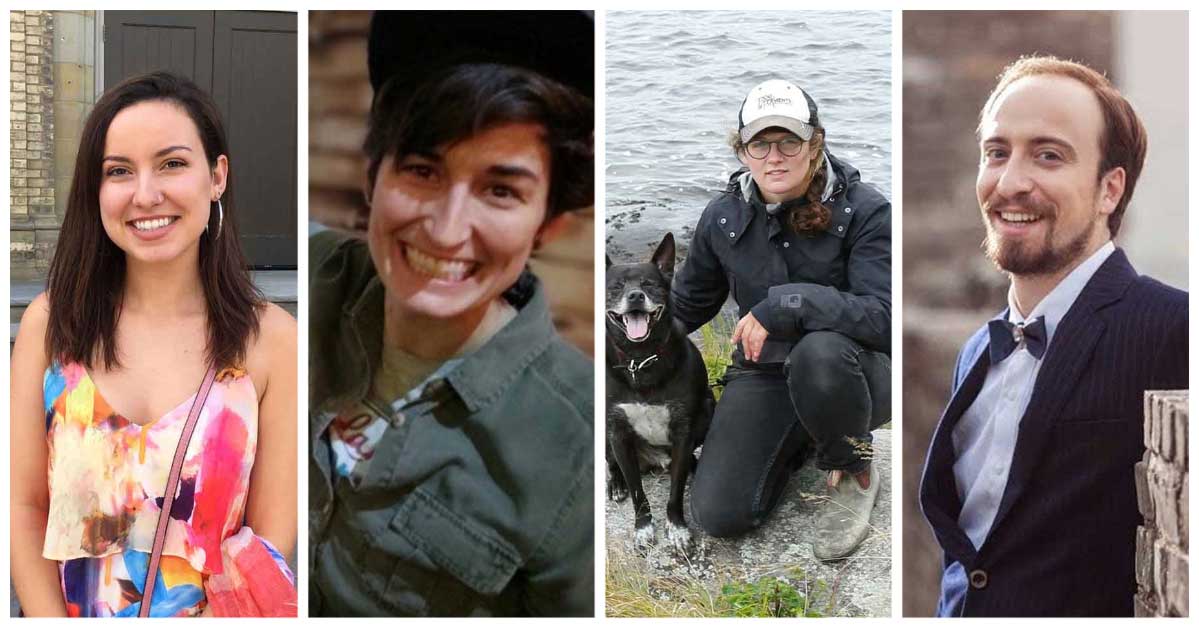
Congratulations Class of 2020
Congratulations and best wishes to the Class of 2020 from the students, faculty, staff, advisory boards, alumni and friends of Falk College! The courage and resiliency you have demonstrated in these challenging times prove you are prepared to respond to society’s greatest needs. Now more than ever, our world needs all you have to offer. We look forward to hearing about your achievements as our newest Falk alumni and eagerly await the future in-person celebration at Falk Convocation and Syracuse University Commencement.
The Dean’s video message to the Class of 2020 was recorded late last year when we were fully expecting our traditional campus celebrations to take place this spring. Since then, the global coronavirus pandemic has impacted all of us in many difficult ways. We recognize how hard this has been for all of our students, and particularly the Class of 2020. While we will celebrate with you at distance for now, we look forward to celebrating together in person when it is safe to do so.
Join the Syracuse University community for the Class of 2020 Virtual Degree Conferral.
Where are they now? Food studies alumni excel on diverse career paths since 2014.
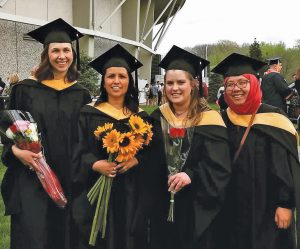
In 2010, one of the fastest-growing fields of study in North America was food studies. At that time, Falk College Dean, Diane Lyden Murphy, had a vision for future academic programs related to food focused on maximizing student opportunities in this area. In 2014, the college announced its new Bachelor of Science in Food Studies, which leveraged resources of the former hospitality management program, as well as intuitive academic collaborations with the nutrition and public health programs in Falk. The first graduate students enrolled in Falk’s Food Studies master program Fall 2015, and a Certificate of Advanced Studies following in 2016. New minors have also been established since that time, including the most recent in Sustainable Food Enterprises.
Food is universal. It impacts every aspect of life, both as a fundamental human need and as a primary component of society in business, culture, politics, and beyond.
Food studies at Syracuse University’s Falk College focuses on the social, political, economic, and environmental contexts of food production, manufacturing, distribution, and consumption—locally, nationally, and globally. Students of the program gain a deep understanding of food policy and governance, gastronomy, health outcomes of food systems, human nutrition, and food access. They also hone marketable skillsets in research, data collection, and analysis, as well as food preparation, presentation and the business of food.
Careers for food studies alumni are as wide-ranging as the issues food studies seeks to address. Some major career prospects include employment with government agencies at all levels dealing with food and agriculture issues; food-oriented non-governmental organizations that work on sustainability and food security issues; the health and wellness industry and food processing, preparation, service and distribution firms.
Falk College food studies alumni employment records show that graduates of the program are succeeding in many different chosen career paths. Here are just some of the job titles held by Falk College food studies alumni:
Business Management and Marketing
Food Studies alumni apply their subject matter expertise in business roles such as sustainability, research and development, logistics analysis, retail, finance, purchasing, supply chain management, communications, marketing, and others.
Employment with food manufacturing, food marketing, restaurants and hospitality businesses are obvious options, but food studies alumni are prepared to work with business in a variety of sectors, spanning health and wellness to travel and tourism.
Alumni job titles:
- Food Service Manager at a Fortune 200 global food and facilities services company (Aramark)
- Catering Assistant for an Illinois restaurant chain (LYFE Kitchen)
- Chef Consultant for a private university in New York State (Syracuse University)
- Social Media for a luxury boutique hotel business operating in several major U.S. cities (The Standard)
- Social Media and Communications Intern for a celebrity nutrition expert and author (Joy Bauer)
- Influencer Marketing Associate for a major U.S. meal kit service (HelloFresh)
- Restaurant Manager for a local farm-to-fork restaurant (3 Sisters Restaurant)
- Kitchen Manager at Upscale Bakery in NYC (Blackseed Bagel)
Government, Policy, and Research
Climate change. Human rights and food access. New agricultural technology and science. These and other major world issues are shaping food career opportunities in government, policy, and research. Food studies alumni work in U.S. government agencies, international governing bodies, and other institutions to help shape legislation, trade, regulation, urban and rural planning and development, and more.
Alumni job titles:
- Plant Protection and Quarantine Technician U.S. Department of Agriculture (USDA) Animal and Plant Health Inspection Service (APHIS)
- Supervisor for U.S. Department of Agriculture (USDA) Special Supplemental Nutrition Program for Women, Infants, and Children (WIC)
- Purchasing & Food Services Administrative Assistant for public school system in Massachusetts (Newton Public Schools)
- Food Sourcing Manager at a major U.S. university (University of San Francisco)
- Community Research Assistant at a university in Canada (University of Guelph)
Nonprofit Organizations
In the nonprofit setting, food studies alumni work in advocacy and service delivery to achieve important social objectives such as public health, environmental health, and fair trade.
Alumni job titles:
- Assistant Youthmarket Manager for a major environmental sustainability organization in New York City (GrowNYC, formerly the Council on the Environment of New York City (CENYC))
- Ocean Policy Associate at an international environmental protection and advocacy organization (Earth Law Center)
- Nutrition Educator for a regional nonprofit public health institute in a major U.S. city (Public Health Corp)
- Public Policy Intern at a statewide anti-hunger organization (Project Bread)
- Intern for member of U.S. House of Representatives
- Food Blogger for an international health foundation (International Bipolar Foundation)
- Account Coordinator for a major U.S. city food bank (Greater Cleveland Food Bank)
- Case Manager II at a statewide homelessness alleviation organization (People Assisting the Homeless (PATH))
Advanced Degree Programs
Some alumni have used their food studies undergraduate degree as a foundation to pursue advanced degrees in health professions, social sciences, legal and policy approaches to food, among others.
Alumni academic pursuits:
- Nursing School (Southern Connecticut State)
- J.D. Law School (Vermont Law School)
- Master of Public Administration (U Penn, Rutgers)
- M.S. Food Studies (NYU, Syracuse)
- M.S. Nutrition Science (Syracuse)
- M.S. Marriage and Family Therapy (Syracuse University)
- Master in Education (Clarkson University)
Learn more about the Food Studies program.
New program equips students to connect food enterprises with positive social change
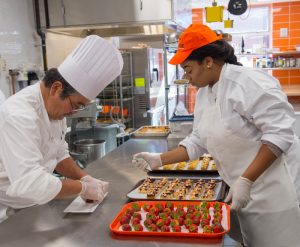
Social justice, health and wellness, environmental sustainability, and other consumer interests are driving increased market demand for “value-based” foods such as organic foods, which comprise 5.7 percent of food sold in the U.S. according to the Organic Trade Association (OTA).
The OTA reports the U.S. organic food market in 2018 at $47.8 billion. The U.S. Department of Agriculture’s Economic Research Service finds that organic food sales have exhibited double-digit growth during most years since 2000 and the organic share has been growing rapidly.
As a result of these industry and market shifts, there is growing demand for food professionals knowledgeable about food industry practice and operations as well as food-related social movements. Sourcing local, organic, or fair trade products for foodservice, retail, or special events is becoming important for firms interested in pleasing consumers and catering to diverse interests.
The Department of Nutrition and Food Studies at Syracuse University’s Falk College recently launched its new undergraduate minor in Sustainable Food Enterprises to prepare students for food industry careers with courses in food safety (ServSafe and Hazard Analysis and Critical Control Points), restaurant and foodservice operations, feeding people on a large-scale, operational and policy aspects of the foodservice industry, and marketing and managing events, conferences, and workshops.
In the minor, students choose from a set of food economies courses focused on labor issues, food enterprises as urban development strategies, establishing and operating emergency feeding systems, food cooperatives, values-based certification systems such as organic and fair trade, and social justice in the food industry. Students can also choose from a set of business courses to acquire skills around marketing, entrepreneurship, event management, and more.
These courses culminate in a senior-level Food Enterprises course designed specifically around the concepts of “impact investing” and “social entrepreneurship,” or structuring firm operations to promote positive social outcomes. “This particular course strengthens their ability to navigate the business side of food and all that encompasses while working for the changes that add value to their areas of interest,” says Chef Mary Kiernan, chef instructor for the Food Enterprises course.
“The topics covered in Food Enterprises prepare students to be in-tune with the business aspects of any food enterprise—from understanding an income statement to what motivates our purchasing choices,” says Kiernan. “The students explore a variety of food enterprises from the traditional eating and drinking segments, to agro (agricultural) economies, to technology shaping our food ways.”
The course is designed for the students to find a problem they would like to tackle and then tackle it with a food enterprise solution. “Students bring perspectives from all over,” she says. Some recent student interest areas in Chef Kiernan’s class include food security on college campuses, laws surrounding food and food enterprises, and individual food items that have a nutritional benefit in the marketplace, among others. “The students also research ESG (environmental, social, and governance) investing to better understand what it means, how it works, who is participating, and at what level,” she adds.
Falk College facilities support student learning, specifically in the Susan R. Klenk Learning Café and Kitchens, where students have access to hands-on learning opportunities in nutrition, dietetics, and culinary-related fields under the guidance of professional chefs as their course instructors. The 5,000-square-foot facility includes experimental food lab and commercial kitchens, a baking nook, and café outfitted with the same equipment found in industry-leading restaurants and culinary institutions.
Devotion to Family, Friends, Food and Social Justice
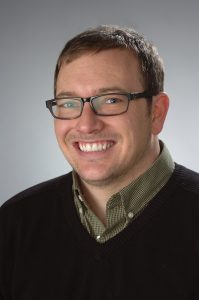
Professor Weissman joined Falk College in 2012 and was instrumental in working as part of the collaborative team that successfully launched a bachelor of science in Food Studies in 2014 and additional academic programs since that time. The undergraduate director of the Food Studies program, he was an affiliated faculty member in Syracuse University’s Aging Studies Institute and the Maxwell School of Citizenship and Public Affairs’ Department of Geography.
He was a highly approachable, committed teacher who was equally comfortable in a classroom and working with students on a compost pile. Whether it was an introductory food studies course or advanced-level offering, Professor Weissman engaged students in community-based work to advance social change. During his popular Farm to Fork course, students explored culinary theory and practice of alternative food networks through cooking laboratories and field trips.
A partnership he created with My Lucky Tummy, a pop-up food court celebrating the refugee and New American community in Syracuse, helped students develop tangible, transferrable skills while making an impact on the community. Students worked side-by-side with chefs from Eritrea, Japan, South Sudan, Iraq and Bhutan, learning about different cultural foodways and developing related competencies. Students’ deep interest in this particular learning opportunity, and the many hours they volunteered for no pay or credit, exemplified the commitment to making communities stronger that he fostered in his students.
His numerous honors include the Syracuse University Excellence in Graduate Education Faculty Recognition Award, the Falk College Faculty of the Year Award for Teaching Excellence, the Syracuse University Faculty Sustainability Fellowship and a Teaching Recognition Award as part of the Laura J. and L. Douglas Meredith Professorship Program, which he received in 2015. That same year, students in his Feeding the City course were honored with a Chancellor’s Award for Public Engagement and Scholarship, an award Evan and his students received on multiple occasions in recognition of meaningful and sustained engagement.
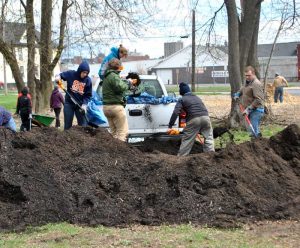
With scholarship that was directly and consistently focused on equity, diversity, and inclusion through community-engaged, participatory teaching, his research sites often became hosts for students fulfilling practicum requirements, and many of his journal publications included student co-authors.
A collaborator who reached across the Syracuse University and SUNY ESF campuses and beyond, he was the recipient of numerous research grants and awards. Most recently he served as principal investigator of the project, Increasing Demand for Local Foods in Cortland County School Meal Program, funded by Cornell Cooperative Extension / NYS Farm to School to raise awareness of and demand for local foods in schools. He was a co-principal investigator on the CUSE Grant, Turbulent Tenancy: Evictions in Syracuse, further illustrating a life-long commitment to interdisciplinary innovation to build and strengthen communities.
Professor Weissman was a founding member and served on the board of Syracuse Grows, a grassroots network that cultivates food justice through advocacy, education, and resources in support of urban food production, and served on the Onondaga County Agricultural Council. His unwavering dedication to these causes also helped launch the newly-formed Syracuse-Onondaga Food Systems Alliance (SOFSA), a multi-sector coalition of stakeholders from across the food system in Onondaga County.
His many professional affiliations included the Agriculture, Food and Human Values Society, the Association for the Study of Food and Society, and the Association of American Geographers where he often chaired conferences and presented at them.
An associate editor of Urban Agriculture and Regional Food Systems he was also an ad hoc reviewer for Agriculture, Food and Human Values; Journal of Agriculture and Environmental Ethics; Journal of Agriculture, Food Systems, and Community Development, and; Renewable Agriculture and Food Systems, among others.
Professor Weissman earned his Ph.D. in geography from the Maxwell School of Citizenship and Public Affairs at Syracuse University. His dissertation, “Cultivating the City: Urban Agriculture and Agrarian Questions in Brooklyn, NY,” explored the tensions between the stated goals and outcomes of urban cultivation. He earned a master of arts in sociology and minor in environmental policy from the University of Tennessee, and a bachelor of arts in environmental policy, administration and law from Binghamton University.
As an educator, mentor, scholar, and friend, Professor Weissman was committed to the human condition, always problem-solving to build better communities. He inspired those around him to advocate for equity in the food system and beyond. Along with his family, the Falk College community, including current students and countless alumni working for food justice and social justice, will continue the work he believed in so deeply as shared in a tribute to his life. Additional details about ways the community will come together to celebrate the life and work of Dr. Weissman will be announced at a later time.
Food studies senior explores the science of food and climate change
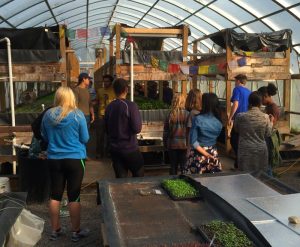
Senior food studies major Sierra Endreny ’20 plans to take her career path in many different directions. “I am passionate about the environment, social justice, health, and food. The food studies program allows me to combine all my interests, and also gives me a broad array of skills and experience when looking for prospective employment,” she says.
As part of her food studies program, Endreny took the Climate Change in the Food System course with professor Rich Welsh, Ph.D. “I wanted to learn more about climate change on a scientific level and how it affects the food system,” she says. “I hope to incorporate environmentalism into my work and this course gave me the tools to do that.”
Professor Welsh is an expert on food and agricultural policy, technological change in agriculture, and the livestock industry. “The course helps students understand the substance and history of climate change research and the scientific consensus that human activities are the primary source of greenhouse gas emissions and global warming,” he says. “In addition, there is substantial material on how global warming will impact food production and food security; and, how agriculture can adapt to a changing climate and mitigate global warming.”
Through the course, students are exposed to a wide variety of topics and issues, from climate-smart agriculture to technological innovations to address climate related-issues in the food sector. “My biggest takeaway was the methods that are used to mitigate and adapt to climate change. I didn’t know that urban gardens could sequester carbon in the atmosphere and lower surface temperatures, while also feeding people and providing community,” says Endreny.
“The issues presented in this course affect all of us,” she adds. “No matter what career path I take, the knowledge from this course will stay with me throughout my life because climate change and food affect everything.”
Falk College Instructor’s Award-Winning Craft Distillery Joins Fight Against COVID-19
A Syracuse Story by Brandon Dyer originally published on April 8, 2020.
According to the World Health Organization (WHO), alcohol-based hand sanitizers are effective against a broad spectrum of microbials and are the best option in places where hand washing and sinks aren’t readily accessible. Since the outbreak of COVID-19 in the U.S., hand sanitizers are nearly impossible to find in stores.
The scarcity of hand sanitizer was a concern for culinary specialist Chris Uyehara, so he investigated the problem to find out how he could help. In addition to teaching professional baking, fine pastry and introductory culinary classes at the David B. Falk College of Sport and Human Dynamics, Uyehara is also owner of the award-winning Last Shot Distillery in Skaneateles, New York. After investigating the logistics and a hand sanitizer recipe posted by the WHO, Uyehara reached a crossroads. “I had some product started. In fact, I had some ready to go, but I said, ‘You know what? I’m going to distill that to make hand sanitizer.’”
Last Shot Distillery has won several gold medals for American whiskey and lightening whiskey, but owner Chris Uyehara’s newest creation is not for consumption.
Uyehara soon reached out to some fellow distillers, and together they switched processes from whiskey production to sanitizers. Uyehara is doing all this while still conducting five distance learning classes, often grading papers late at night and into the morning. “It’s challenging, but there’s a need for the sanitizers right now,” he says. “We’re not even touching a small portion of what the needs are.”
“My target was to bring sanitizers to independent senior living facilities,” says Uyehara. Hand sanitizers are essentially ethanol with added glycerin or glycerol and hydrogen peroxide. Using a variation of his vodka recipe, Uyehara cooks corn sourced from Cayuga and Onondaga counties and triggers a fermenting process. “You take the alcohol out of that fermentation and distill it,” he says. The WHO recommends a minimum of 160 proof for sanitizers, which translates to 80% alcohol by volume. Last Shot Distillery—always an overachiever, with gold medals for American whiskey, corn whiskey moonshine and lightening whiskey—distills its hand sanitizer to 170 proof.
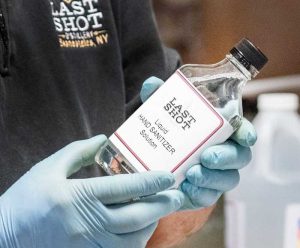
Last Shot Distillery charges WHO’s suggested wholesale amount for the bottles being sold. While this is enough to cover expenses, the company isn’t turning a profit on the new venture. That’s fine with Uyehara. “There’s a need. People are scared. They want sanitizers,” he says. Last week, he sold 500 bottles in two days. Since then, many local businesses have expressed interest. Last Shot has switched gears and is offering half-gallon containers to meet that demand.
With large and small businesses across the country switching gears to manufacture medical equipment, Uyehara is happy Last Shot can pitch in to help. “We may not be big like the big boys, but at least we can assist in our own community and do something good.”
Coronavirus pandemic shows the importance of our food system
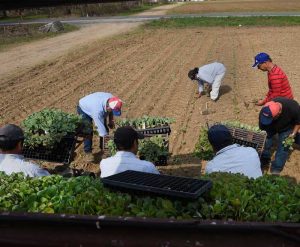
The faculty of the Department of Nutrition and Food Studies recently submitted a commentary to The Post Stanard showing how the COVID-19 pandemic lays bare important contradictions within the modern food system. Faculty expounded how critical the food system is, with its workers, managers, business owners, and firms. However, the inequalities in the system have become apparent during this crisis: Workers in the food system are precarious, lack adequate pay and health benefits, and yet are asked to take risks to ensure food is available so we all can eat.
Professor Mary Kiernan asked her students in a sustainable food business course: “How do you think the COVID-19 pandemic will change the supply chain in food and foodservice purchasing in the future?” To answer this question her students needed to examine the entire food system including, agricultural production, cross-border food networks, labor relations and rights, immigration policies, food manufacturing and distribution, and nutrition science and education. We take the food system for granted as we shop, prepare our meals or purchase our food. This might change after the pandemic eases.
Understanding how the crisis affects the food system begins by looking into the vast U.S. farm system, from industrial-scale farms to many small- and medium-sized family farms. These farms rely on workers from other countries, largely from Mexico and Central America. These workers, as well as those who prepare our food and stock the shelves, drive and load and unload the trucks etc., are continuing to work and put themselves, and family members, at-risk.
The Department of Nutrition and Food Studies has always appreciated the important role of the food system and all who make it function so well; and, they hope that the current emergency situation will highlight how important this system is to our elected officials, policy-makers and to the public in general.
Read the full article at Syracuse.com
Food Studies major named 2020 Mount Vernon Leadership Fellow
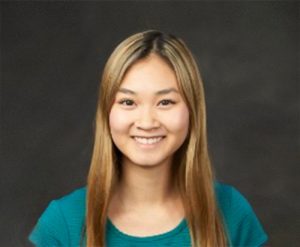 Phoebe Ambrose, a sophomore majoring in food studies in the Falk College and citizenship and civic engagement in the Maxwell School, has been named a 2020 Mount Vernon Leadership Fellow.
Phoebe Ambrose, a sophomore majoring in food studies in the Falk College and citizenship and civic engagement in the Maxwell School, has been named a 2020 Mount Vernon Leadership Fellow.
Ambrose was one of 14 fellows selected from among more than 900 applicants and is Syracuse University’s first Mount Vernon Fellow. The award provides Ambrose with the opportunity to participate in a six-week, fully funded institute at both George Washington’s Mount Vernon estate and in Old Town Alexandria, both in Virginia. In addition to costs associated with institute tuition, travel, room, and board, Ambrose will receive a $3,000 stipend as part of the fellowship.
Owing to coronavirus mitigation efforts, the summer 2020 edition of the Mount Vernon institute has been deferred until further notice. When it is held, Ambrose will have the chance to enhance her leadership skills both in the classroom and through interactions with senior leaders in government, corporate and nonprofit positions. Additionally, the fellowship provides Ambrose with an opportunity to connect with other young leaders from across the United States in order to build a network devoted to changing the world. At the conclusion of the program, Ambrose will have the chance to design, implement and present results from a capstone project meant to benefit local communities.
Much of Ambrose’s undergraduate work has focused on community gardening. She has invested time as a volunteer at Brady Farm, a Syracuse community garden that provides organically grown food to local communities and runs urban ecology workshops. This past summer, Syracuse University began its own community garden, Pete’s Giving Garden, and Ambrose’s capstone project as a Mount Vernon Fellow will focus on increasing local community engagement with the garden.
Ambrose grew up on a farm and attended Manlius Pebble Hill School in nearby DeWitt. She plans to pursue a master’s degree before moving into the nonprofit sector, and hopes to found and run an organization focused on implementing community gardens in schools. Ambrose sees farming as an important way people can learn resilience, adaptability and self-sufficiency. A member of Alpha Gamma Delta, she is also an Invest in Syracuse Scholar and a member of the Renée Crown University Honors Program. Ambrose worked with the University’s Center for Fellowship and Scholarship Advising (CFSA) on her application for the fellowship.
The Mount Vernon Leadership Fellowship, in its sixth year, has built a reputation for identifying and attracting top talent. Previous recipients have gone on to win additional prestigious awards, including Fulbright, Schwarzman, Rangel and Trump Fellowships. You can read more about the fellowship at the Mount Vernon website. For more information about this and other scholarship and fellowship opportunities available, please contact the CFSA at cfsa@syr.edu.
This story was originally written by Dominic Wilkens, a Ph.D. candidate in geography in the Maxwell School and published at news.syr.edu
Supporting students with intellectual and developmental disabilities through InclusiveU
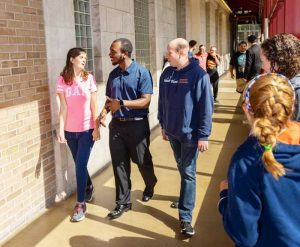 Through InclusiveU, students with intellectual and developmental disabilities can be part of a strong community, taking advantage of opportunities across campus while learning to be independent.
Through InclusiveU, students with intellectual and developmental disabilities can be part of a strong community, taking advantage of opportunities across campus while learning to be independent.
As one of 20 model programs in the United States for transition and postsecondary programs for students with intellectual disabilities, Syracuse University’s InclusiveU sets an example other programs want to follow. Through InclusiveU, an initiative of the Lawrence B. Taishoff Center for Inclusive Higher Education, students with intellectual and developmental disabilities are part of a strong community where they are fully included with their peers.
InclusiveU students take a reduced course load of two to three classes per semester, working toward a certificate in their area of study. In their senior year, they complete two full-time, 15-week internships in a variety of departments on campus and with local employers. InclusiveU boasts a 100 percent employment rate for graduates, compared to the national average of approximately 17 percent for individuals with intellectual and developmental disabilities.
Evan Weissman, associate professor of food studies in Falk College, has taught InclusiveU students for the past several years. He sees firsthand how the power of the program extends to the campus community. “Other students are able to think about the diversity of our student body and see the opportunities for people at our University who have different life experiences,” he says.
Weissman says he appreciates the opportunity to be part of the effort to create a more inclusive learning space and campus. “As an instructor, diversity forces me to constantly reevaluate my teaching methods and ensure that I am delivering class content in ways that reach a wide variety of students,” he says.
Read more about the InclusiveU experience.
Page 11 of 21
